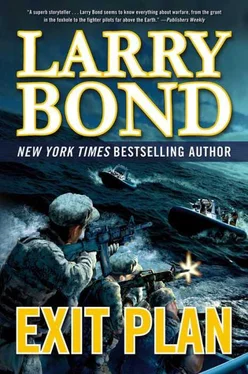“If you’re suggesting we ask the navy for assistance, that will not sit well with my colleagues,” Moradi said, “I’m sure you remember how hard the Pasdaran had to fight to get sole control of the Persian Gulf.”
“Yes, sir, I do. But can you think of another way to find and kill an American submarine? No disrespect, sir, but the Pasdaran Navy is not equipped to hunt down a submarine. And finding that submarine not only helps us find their friends on land, but will interfere with their attempts to escape.”
“All right,” Moradi conceded. “You’ve made your point. I’ll speak to the commanders of both navies immediately.”
The Outskirts of Bandar Charak
1215 Local Time/0915 Zulu
Highway 96 left the coast halfway to Bandar Charak, bending north, then east again, skirting around a mass of rough rocky hills between the highway and the coast. Following Shirin’s instructions, north of Charak they turned right onto another paved road that would take them straight into town. The road lay between the hills to the west and an eroded flat plain to the east. Neither showed many signs of man.
They stopped a couple of kilometers north of town. A grove of trees on a low hill gave cover, and after they’d unloaded everything from the van, Ramey and Phillips drove it back north half a kilometer. A dirt road ran at right angles into the hills from the paved highway, and they hid the van there, sanitizing it like they had the Peykan.
Yousef and Shirin had wanted to take the van into town, but both Ramey and Jerry had decided against it. “By now the patrol’s been missed, and they’re looking for their vehicle.” That meant Shirin and Fazel would have to walk into town, and her uncle’s house was at the southern end of town, near the water.
While the two SEALs hid the car, the others under Lapointe’s guidance worked on setting up what would be a layup position at least until that evening, and quite possibly for a day or two. It was nearly 1230 by the time Ramey and Phillips returned. After inspecting their newest home, Ramey pronounced it acceptable. “Time for phase two.”
* * *
Shirin looked at Harry in the stolen Basij uniform. They had a pair of pants and a uniform shirt that more or less fit him, but they hadn’t taken any boots from the corpses. “I wouldn’t change these anyway,” he told her. “Nobody will notice the difference, especially after we’ve been walking for a while.”
The American had left all his equipment behind, except for his radio, which he’d hidden in a pocket. Reluctantly, Yousef handed him the Iranian-made pistol and gun belt. They had the rifles they’d taken from the Basij soldiers, but they’d all agreed a rifle might draw unnecessary attention from the authorities. Basij normally wouldn’t carry one unless they were on duty.
The American also had the identity papers for the dead Basij corporal, a Qassem Molavi. The photo, height, and weight were wrong, but they might pass casual examination.
Together, they worked on a legend, with “Corporal Molavi” escorting his sister-in-law “Miryam” to visit her family in town. Shirin’s husband was away on duty with the Pasdaran, and no self-respecting Iranian woman, especially a pregnant one, would travel unaccompanied by a male relative. It was also true that no self-respecting Iranian husband would let his wife be accompanied by a stranger, but Yousef could see no alternative.
“I wish you didn’t have to do this,” Yousef had told her. He was looking at the American while he said it.
“I don’t want to do this either,” she’d answered. “I hate the thought of walking that far. But it won’t be bad. And I’m looking forward to seeing Uncle Seyyed. I know he will help us.”
“I also wish I knew something about the Charak Basij Brigade,” Yousef complained. Looking directly at Harry, he warned, “Remember, you’re wearing an Iranian corporal’s uniform now. Show some discipline. If you act the same way you do with your own officers, they’ll either spot you as an impostor or throw you in jail for insubordination.”
Anger flashed across Fazel’s face and into his voice. “You don’t have a clue about what it means to be a professional soldier. It’s going to be easy to pretend I’m Basij. I’ll just act like a thug. Oh, no, wait, that’s if I want to be Pasdaran.”
Shirin threw herself between the two men, and while the other Americans may not have understood Farsi, they knew trouble when they heard it. Lapointe and Phillips were closest. They managed to move so that while they discouraged Fazel from saying anything else, they stood with their teammate, facing Yousef. “That’s enough,” Lapointe ordered. Looking at Ramey and Jerry, he said, “It’s time to go.” Both officers nodded.
Embracing Yousef one last time, Shirin sighed and followed “Qassem.” They waited briefly, made sure the highway was empty, and hurried out to the roadside. Although it was early April, in the south it was already in the low twenties of degrees Centigrade. This close to the water, the southerly breeze was humid, but thankfully cool.
The Bandar Charak Road ran almost straight north-south here, two lanes of asphalt bordered by wide shoulders that blended with the surrounding landscape, sometimes almost seamlessly. It seemed flat, but as they walked, Shirin could see that the road cut through a series of low, gently sloping dunes.
Harry explained, “It’s a little less than two kilometers to the edge of town. We should get there in half an hour or so.”
“Fine, Qassem. So tell me about yourself. How old are you? Do I have any other in-laws?” Her tone was humorous, but she knew she was right. They were supposed to be family, even if only by marriage.
They walked in silence for a few minutes before the American answered. “We are not supposed to share personal information with the people we meet, but we are also taught that if we have to construct a legend, it’s best to stay close to the truth. I am twenty-eight.”
“So you’re Yousef’s older brother. Yousef is twenty-four. You have” — she paused for a moment—”had another brother, three years younger than Yousef, Ali. He was at university, but protested the 2009 elections and was arrested. He was killed in prison, by the Pasdaran.”
“I’m sorry. That must have been hard on Yousef and our parents.”
“Your father passed away several years before that. Your mother was diagnosed with Alzheimer’s disease earlier in 2009, and the loss of her younger son accelerated her decline. Ali was the only family Yousef had. That is why it is so important that the two remaining brothers should get along.” Her plea came from her eyes, as well as her voice.
Harry walked silently for several minutes. “Alright. Thank you for telling me about Ali. But why would Yousef join the Pasdaran if he felt that way?
“He was already in, and stayed because of me, and because leaving the Pasdaran without good reason is not always easy, or safe.”
They walked and worked out several more details of his life. She and Yousef had met in Shiraz, so it made sense that “Qassem” lived there. He was an army veteran who had joined the Basij, and was studying to be a paramedic.
“I’m probably in charge of giving first aid classes to my fellow Basij fighters.”
“Don’t take them lightly,” she warned sternly. “They don’t, and they’re a law unto themselves. Yousef wasn’t wrong about being careful.”
She was telling Harry about Shiraz when they reached the edge of town, with scattered houses stretching away from the road. The city limits were officially marked by a small traffic circle, busy but not crowded with traffic in the middle of the day. The center island was filled with carefully tended greenery.
Читать дальше












